Warm Instead Of Cold
The Best Destinations for a Long Winter Holiday
Given the cold, wet weather in Germany, are you looking forward to a winter in the sun? Many tour operators are offering good deals for a winter break – sometimes even for long-term stays. We reveal which travel destinations are ideal for wintering.
Are you the kind of person who hates winter? Do you dread the idea of wearing layers, cold fingers and toes, and wet, cold weather with temperatures below zero?
Would you rather wear flip-flops instead of squeezing your feet into boots on a skiing holiday, and relax on the beach instead of racing down the ski slopes? Then you should simply skip the winter and spend the winter in warmer regions.
Important for planning your winter holiday
When planning your winter stay, you should keep the following rule of thumb in mind: the closer the potential holiday destination is to the equator, the warmer it is. In the case of Germany, it makes little sense to travel north in winter. Potentially sunny travel destinations are the countries further south.
Hotels in Turkey, for example, are set up quite winter-friendly. Tour operators such as Dertour and Tui also offer long-stay options from January to March. Tunisia is also a good and inexpensive place to spend the winter in warm weather.
Pleasant temperatures of around 20 to 25 degrees can also be reached in some destinations in Europe. If you want it to be really hot, however, you will have to choose a long-distance destination. We’ll tell you a few nice destinations for both preferences:
Europe and middle distance: Here it is warm in winter
Andalusia
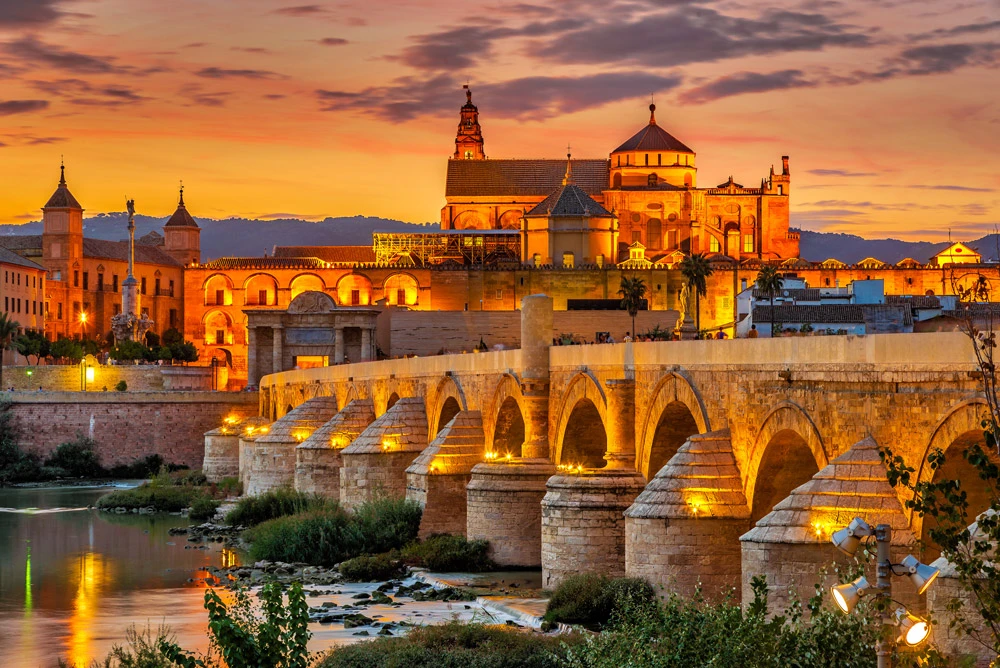
The popular holiday destination of Spain is also recommended for sun lovers in winter. The southern parts of the country are particularly worth a visit. In Andalusia, for example, temperatures are around 20 degrees even in winter, and the sun always shines except for a few days a month. It only gets a little cooler at night, so accommodation with heating is recommended.
Granada, for example, is ideal for city trips. There, the number of visitors to popular museums and places like the Alhambra is significantly lower than in the summer months. In Málaga, you can first relax in the old town with its colorful houses, plazas and churches. Then you can take a walk to the city beach, Playa la Malagueta. For more than a kilometer, you can soak up the sun among locals and other travelers.
Winter is also wellness time: The Arab baths in Córdoba, Seville and Granada are particularly worth a visit. There you can get a massage and relax in warm water, surrounded by aromatic scents.
Canary Islands
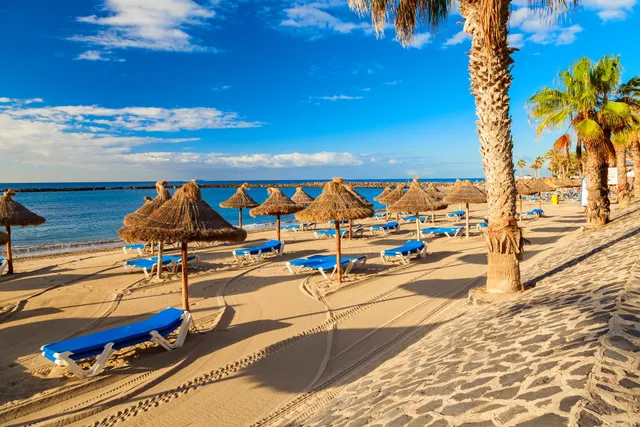
Due to their proximity to Africa , the Canary Islands, which belong to Spain, are a little warmer in winter than the mainland. On Gran Canaria, Tenerife, Las Palmas, Lanzarote and Fuerteventura, temperatures of around 25 degrees are more than bearable in winter.
Even swimming in the sea is still possible without any problems. And there is almost a guarantee of sunshine: it shines on the islands for more than 300 days a year – which is why they are also known as the “islands of eternal spring”.
If that’s a bit too far for you. In contrast to Germany, the Spanish Balearic Islands, which also include Mallorca and Ibiza, are also relatively mild in winter, but temperatures can drop to low single figures at night. A jacket should therefore be a must in your suitcase for a holiday in Mallorca in winter.
Madeira

The Portuguese island of Madeira can be reached within about four hours by plane and has pleasant temperatures all year round – the weather is particularly mild in December. You can expect temperatures of up to 20 degrees on the island, and up to 19 degrees in January and February. This is not the typical bathing weather, but Madeira is not the typical island for a beach holiday either. Instead, it’s all about hiking!
The island in the Atlantic off the coast of Morocco is characterized by a rugged volcanic landscape and is crossed by levadas, old irrigation paths with footpaths. One path leads to the 1,862 meter high summit of Pico Ruivo – the highest mountain on the island.
Cyprus
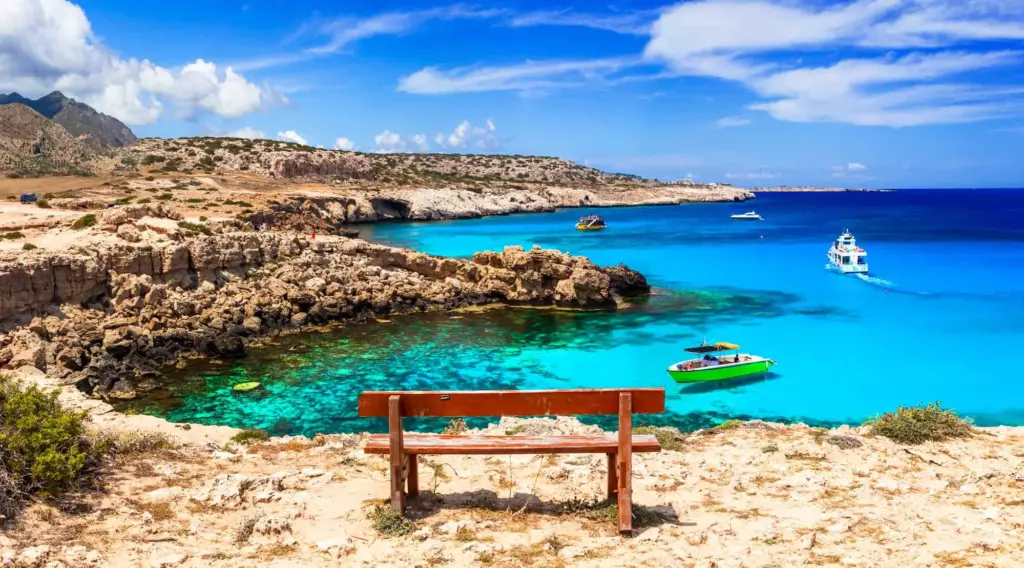
It is also warm in the winter months on the Mediterranean – in Greece and Cyprus. While temperatures here easily reach 40 degrees in midsummer, winter is much milder with average temperatures between 15 and 20 degrees, but still very pleasant.
Even in winter, there is only rainfall on average every third day in Cyprus. This makes winter the ideal time for hikes and city trips to Larnaka, Nicosia or Limassol. While the beach promenade there is regularly crowded in summer, a walk in winter is relaxing. It is worth taking a detour to the old harbor or the market halls.
The idyllic mountain villages in the Troodos Mountains are also great to explore in the winter months. There are four hiking trails around the peak of Olympos with melodious names such as “Artemis”, “Atalante”, “Kaledonia” and “Persephone”. Along the way, keep your eyes peeled for eagles, foxes and the Cyprus mouflons that only occur on the island.
In addition, such hikes can be easily combined with visits to monasteries and churches, which are very numerous in this region. The hardiest can even take a dip in the Mediterranean, where the water temperature is still 17 degrees even in February.
Malta
Don’t feel like sleet and wearing thick winter jackets? You can also have a good time in the island state of Malta during the winter months. 300 days of sunshine per year and average temperatures of 16 to 21 degrees in the months November to February speak for themselves.
In addition to Malta, the Republic also includes Gozo and Comino – the islands lie between Sicily and North Africa. Because the temperatures are mild even in winter, there are outdoor restaurants in many busy squares in the small towns and cities. For example, in the capital Valletta, many cafés and restaurants in the picturesque alleys and streets set up their tables on the steep stairs that lead down to the harbor – this creates a very special atmosphere and is pure holiday feeling.
In addition, many festivals take place in winter – accompanied by fireworks. The New Year’s Eve celebrations on Saint George’s Square in Valletta attract visitors with music, dancing and parties until the early hours of the morning, and the Valletta Baroque Festival puts the historic palaces and theaters on display with traditional music.
You can also go hiking in Malta: popular routes lead along the coastal path over the Dingli Cliffs in the southwest of Malta or the Marfa Ridge, a ridge with an impressive coral lagoon. From here you also have a wonderful view of the neighboring islands of Gozo and Comino.
For more detail click below:
Visit Visa Services from Pakistan
Turkish Riviera
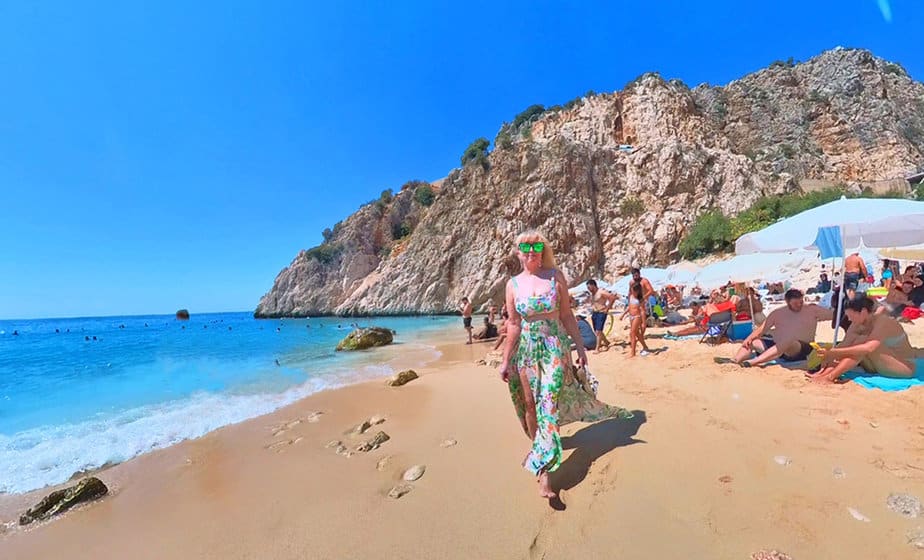
The Turkish Riviera also has a mild climate in winter, which is sure to please travelers from Central and Northern Europe. On the southern Mediterranean coast in Side, for example, maximum temperatures of up to 20 degrees are reached in November, and in January temperatures of up to 15 degrees are still reached.
You can feast on delicious food – pide, gözleme, grilled specialties, kofte, ayran and sugary desserts like kunefe would be worth a trip alone. Antalya, Alanya and Side are also worth a city trip. Explore the old towns, go shopping or visit ancient sights such as the Roman theater and the Apollo Temple.
The area also offers great nearby destinations, including waterfalls, Alanya Castle and Dalatas Cave.
Egypt
In Egypt, you don’t have to freeze in the winter months. Since the country is located in the dry belt of North Africa, it generally has a dry desert climate. In summer, this leads to strong heat waves and in winter to a light breeze.
The area around Hurghada on the Red Sea is particularly popular with German-speaking travellers for wintering. From November to April, the average air temperature is just under 25 degrees, and it hardly ever rains. The Red Sea is one of the warmest seas on earth; even in the winter months, its temperature rarely drops below 22 degrees, providing perfect conditions for swimming, snorkelling and diving. The salt content in the water is quite high, at up to four percent.
Many people also appreciate the healing climate in the Red Sea region. It is ideal for a holiday for people with rheumatic diseases and arthritis, skin diseases such as neurodermatitis, shingles, psoriasis, and respiratory diseases.
Warm long-distance travel destinations for the winter
Cape Verde
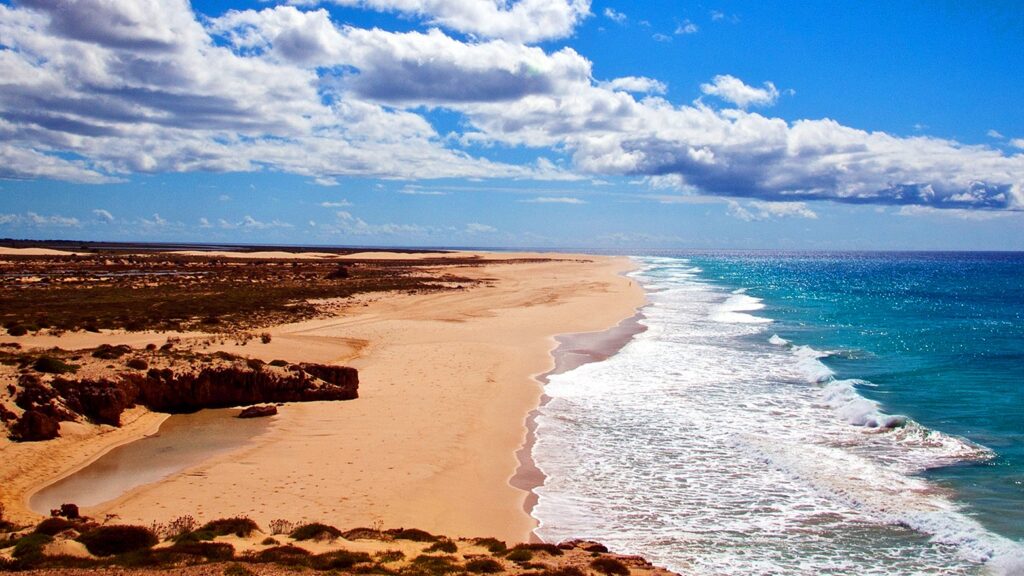
You can reach the Cape Verde Islands by plane in six to eight hours . This means you can escape the German winter and land at average temperatures of 27 degrees and a good seven hours of sunshine per day. Between November and February, precipitation only falls on average on two days.
The archipelago lies about 570 kilometers off the west coast of Africa and consists of ten islands, nine of which are inhabited. A total of 500,000 inhabitants live in an area of just 4033 square kilometers. This makes the Cape Verde Islands one of the smallest countries in the world. The motto is “No stress”; even on the two islands that are best developed for tourism, Boa Vista and Sal, life is slower.
The islands were uninhabited before they were discovered and settled by the Portuguese in 1456. A new Creole culture was formed from the mixing of the cultures of European settlers and African slaves. It was not until 1975 that Cape Verde became an independent republic, and the official language remains Portuguese.
Must Visit:
Cuba
When it gets wet and cold in Germany, the best time to travel to Cuba begins. The reason for this is the subtropical climate on the largest island in the Caribbean. In December, temperatures of up to 30 degrees and sunshine beckon. The best time to enjoy what sun-hungry travelers dream of: snow-white beaches on a warm, turquoise sea, lined with shady palm trees. On the large main island and the small islands off the coast, the so-called Cayos, you are spoiled for choice with hundreds of tropical beaches.
Away from the sea, Cuba offers an exciting culture in which music, salsa, rum and cigars play a major role. The architecture is also fascinating, with many buildings dating back to the colonial era. The colorful houses with balconies and courtyards lined with columns are definitely worth a visit! You’ll find a particularly large number of them in the capital, Havana.
Last but not least, Cuba is exciting because it has one of the last active communist regimes in the world. Its politics and its very special history, especially linked to the revolution that began in 1953, make the island state unique.
Important note: According to the Federal Foreign Office, trips to Cuba must be very well prepared due to the deterioration in the energy supply (as of November 01, 2024). Find out about the current situation. We have summarized what travelers can expect in this article.
Mauritius
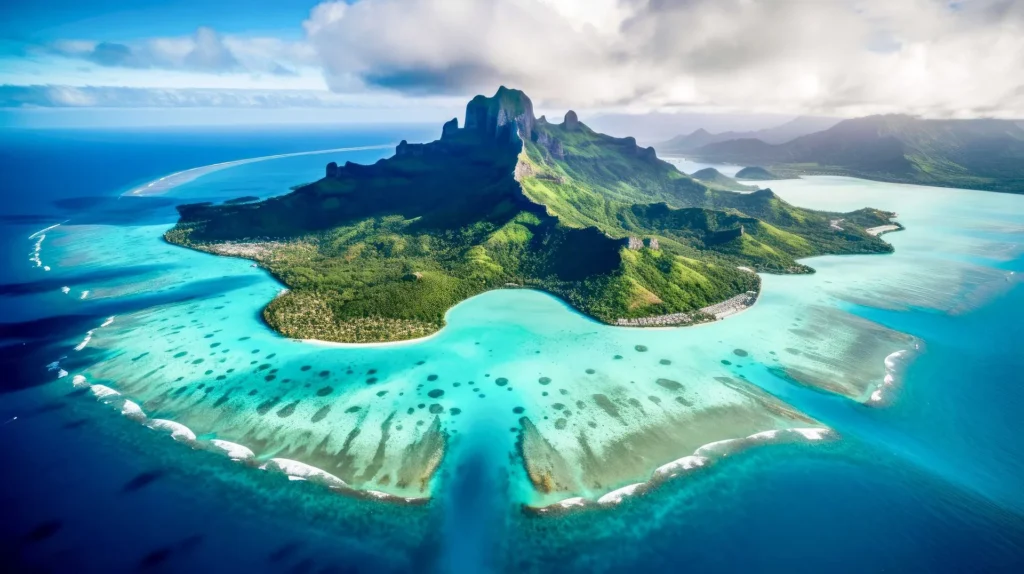
Mauritius is located 9,200 kilometers from Frankfurt in the middle of the Indian Ocean – roughly at the same latitude as Madagascar. The East African island state was once named the “most romantic place in the world” at the World Travel Awards.
This is not only due to the hotels, but also to the landscape: the island is surrounded by a large reef that is only interrupted once in the west. Otherwise, almost all of the beaches slope gently into the water, the waves lapping quietly and inviting you to spend hours snorkeling, swimming or splashing around.
Mauritius also stands for sustainable tourism. And so today there are 300 kestrels living in the Kestrel Valley, a falcon-like bird that only exists in Mauritius. In the mid-1970s there were just four specimens left. You can observe them very well in winter – at an average temperature of 24 to 27 degrees and low humidity.
Thailand
If it is cold and wet in Germany, then Thailand will also welcome you with the best time to travel. From December to March is the dry season. Then the temperatures are pleasant at around 25 degrees and the sun shines for an average of nine hours a day.
Perfect weather to enjoy the paradisiacal beaches in the south of the country. The most popular destinations include Ko Phi Phi, Phuket and Koh Samui. If you don’t just want to lie around, exciting cities like Bangkok and Chiang Mai beckon with magnificent temples and delicious street food.
Winter is also the perfect time for a jungle safari in Thailand. The Western Forest Complex is the largest contiguous nature reserve in Southeast Asia. It includes six wildlife sanctuaries and twelve national parks, including Kaeng Krachan on the border with Myanmar. In addition to elephants, bears and leopards, numerous other mammal and bird species live there.
Belize
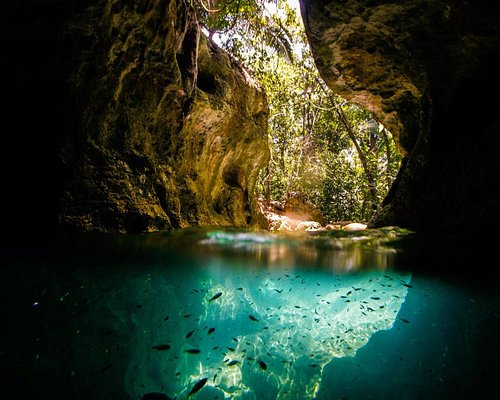
Belize is one of the smallest countries in Central America – it is only slightly larger than Hesse. And yet there is a lot to discover there: the main attraction is the largely untouched landscape.
The tropical rainforests are home to 70 different orchid species and almost 700 native tree species, as well as monkeys, tapirs, pumas and jaguars. And you’re probably familiar with the offshore Barrier Reef with its hundreds of islands and three atolls – a dream for snorkeling and diving!
In addition, Belize has a great linguistic and cultural diversity: the main groups are Latinos and Creoles, while Mayas, Garifuna and the Mennonites, who speak Low German and some High German, also form significant minorities.
Winter is a good time to explore the country! From November onwards, rain and humidity decrease, and the high season begins in December. From January to March it is very dry and nice and warm with temperatures of up to 27 degrees.
Blog Forbes Daily: Join the Blog Forbes and get our best stories, exclusive reports and important analysis of the business daily, News, Travel, Health, Lifestyle and more.

